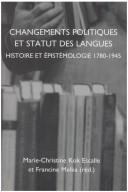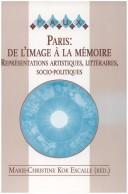| Listing 1 - 9 of 9 |
Sort by
|
Book
ISBN: 3261038543 Year: 1988 Volume: 364 Publisher: Berne,New York : P. Lang,
Abstract | Keywords | Export | Availability | Bookmark
 Loading...
Loading...Choose an application
- Reference Manager
- EndNote
- RefWorks (Direct export to RefWorks)
Culture --- Semiotic models --- Modèles sémiotiques --- France --- History --- Study and teaching --- Historiography --- Histoire --- Etude et enseignement --- Historiographie --- Semiotic models. --- Modèles sémiotiques --- Study and teaching. --- Historiography.
Book
Year: 1988 Publisher: Berne Lang
Abstract | Keywords | Export | Availability | Bookmark
 Loading...
Loading...Choose an application
- Reference Manager
- EndNote
- RefWorks (Direct export to RefWorks)
Book
Year: 1988
Abstract | Keywords | Export | Availability | Bookmark
 Loading...
Loading...Choose an application
- Reference Manager
- EndNote
- RefWorks (Direct export to RefWorks)

ISBN: 9042013753 900448566X 9789042013759 9789004485662 Year: 2001 Volume: 206 Publisher: Amsterdam Rodopi
Abstract | Keywords | Export | Availability | Bookmark
 Loading...
Loading...Choose an application
- Reference Manager
- EndNote
- RefWorks (Direct export to RefWorks)
Dans quelle mesure les changements politiques ont-ils des effets sur la place qu'occupe une langue étrangère dans les pratiques sociales, culturelles et éducatives ? Le contexte socio-culturel dans lequel s'inscrit une langue étrangère est déterminant, tant en ce qui concerne la société cible que la société source. L'étude de l'influence de ces contextes respectifs sur l'image et les pratiques de cette langue forme le cadre de la problématique de ce recueil : "Changements politiques et statut des langues". L'usage de la langue comme pratique culturelle, la pédagogie de l'apprentissage qui apparaît dans les manuels de langue étrangère et la réflexion savante sur la langue et la didactique sont trois paramètres qui se retrouvent au fil des contributions présentées lors du colloque de la S.I.H.F.L.E.S. (Société Internationale pour l'Histoire du Français Langue Étrangère ou Seconde) qui s'est tenu à l'Université d'Utrecht en décembre 1999. Les effets du politique et des idéologies politiques sur le statut d'une langue étrangère et sur la perception de sa fonction sont étudiés dans cet ouvrage sur une large période allant du XVIIIe au XXe siècles et dans divers pays du Bassin méditerranéen et de l'Europe du Nord, mais aussi dans le contexte de la Francophonie.
French language --- Historical linguistics --- Sociolinguistics --- anno 1700-1799 --- anno 1800-1999 --- Language policy --- Political aspects --- History --- -French language --- -Historical linguistics --- -Glottopolitics --- Institutional linguistics --- Language and languages --- Language and state --- Languages, National --- Languages, Official --- National languages --- Official languages --- State and language --- Communication policy --- Language planning --- Diachronic linguistics --- Dynamic linguistics --- Evolutionary linguistics --- Language and history --- Linguistics --- Langue d'oïl --- Romance languages --- -Political aspects --- Government policy --- -History --- -Diachronic linguistics --- Glottopolitics --- Congresses --- France --- 19th century --- French language - Political aspects - Congresses. --- Language policy - France - Congresses. --- French language - History - 19th century - Congresses. --- Historical linguistics - Congresses. --- French (Language) --- Political aspect
Book
ISBN: 9782090371253 2090371250 Year: 2012 Publisher: Paris Clé international
Abstract | Keywords | Export | Availability | Bookmark
 Loading...
Loading...Choose an application
- Reference Manager
- EndNote
- RefWorks (Direct export to RefWorks)
talenonderwijs --- taalmethodes --- Frans --- Didactics of French --- French language --- didactiek --- tweede taal
Multi
ISBN: 9789462980594 9462980594 9789048529988 9048529980 Year: 2017 Volume: *2 Publisher: Amsterdam Amsterdam University Press
Abstract | Keywords | Export | Availability | Bookmark
 Loading...
Loading...Choose an application
- Reference Manager
- EndNote
- RefWorks (Direct export to RefWorks)
For centuries, French was the language of international commercial and diplomatic relations, a near-dominant language in literature and poetry, and was widely used in teaching. It even became the fashionable language of choice in the eighteenth and nineteenth centuries for upper class Dutch, Russians, Italians, Egyptians, and others for personal correspondence, travel journals, and memoirs. This book is the first to take a close look at how French was used in that latter context: outside of France, in personal and private life. It gathers contributions from historians, literary scholars, and linguists and covers a wide range of geographical areas.
Intiem taalgebruik --- Taal en culturele identiteit --- Discoursanalyse --- tweetaligheid --- meertaligheid --- Taal en culturele identiteit. --- Discoursanalyse. --- tweetaligheid. --- meertaligheid. --- Analyse du discours. --- Ethnicité. --- French language --- History. --- Usage. --- Sociolinguistics --- anno 1500-1599 --- anno 1600-1699 --- Europe --- Tweetaligheid. --- Meertaligheid. --- Francophonie French as second language Diglossia Bilingualism Expression of the "intimate" self Intercultural competence in Foreign Language writing Egodocuments.
Multi
ISBN: 9789462980617 9789048530007 9048530008 9462980616 Year: 2017 Publisher: Amsterdam Amsterdam University Press
Abstract | Keywords | Export | Availability | Bookmark
 Loading...
Loading...Choose an application
- Reference Manager
- EndNote
- RefWorks (Direct export to RefWorks)
Before the modern nation-state became a stable, widespread phenomenon throughout northern Europe, multilingualism-the use of multiple languages in one geographical area-was common throughout the region. This book brings together historians and linguists, who apply their respective analytic tools to offer an interdisciplinary interpretation of the functions of multilingualism in identity-building in the period, and, from that, draw valuable lessons for understanding today's cosmopolitan societies.
Historical linguistics --- Sociolinguistics --- anno 1500-1799 --- anno 1800-1899 --- Europe: North --- Multilingualism --- Languages in contact --- Language and culture --- Culture and language --- Culture --- Areal linguistics --- Plurilingualism --- Polyglottism --- Language and languages --- History. --- Multilingualism Francophonie Language teaching Early Modern period Autodidactics History of language contacts.


ISBN: 904200049X Year: 1997 Volume: 122 Publisher: Amsterdam [etc.] Rodopi
Abstract | Keywords | Export | Availability | Bookmark
 Loading...
Loading...Choose an application
- Reference Manager
- EndNote
- RefWorks (Direct export to RefWorks)
French literature --- Thematology --- anno 1700-1799 --- anno 1800-1999 --- anno 1600-1699 --- Paris --- European literature --- Europeans --- Public opinion --- Littérature européenne --- Themes, motives --- Congresses --- History --- Thèmes, motifs --- Congrès --- France --- Paris (France) --- Paris (France) dans la littérature --- Foreign public opinion, European --- Civilization --- In art --- In literature --- Civilisation --- Littérature européenne --- Thèmes, motifs --- Congrès --- Paris (France) dans la littérature --- Congresses.
Book

ISBN: 9783110854572 Year: 2019 Publisher: Berlin Boston
Abstract | Keywords | Export | Availability | Bookmark
 Loading...
Loading...Choose an application
- Reference Manager
- EndNote
- RefWorks (Direct export to RefWorks)
| Listing 1 - 9 of 9 |
Sort by
|

 Search
Search Feedback
Feedback About UniCat
About UniCat  Help
Help News
News